A queer dance champion’s guide to experiencing queer tango in Buenos Aires
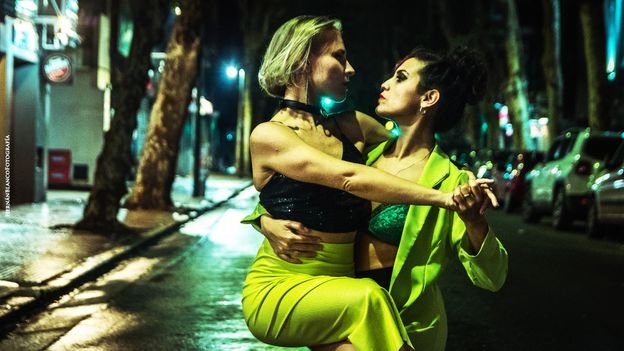
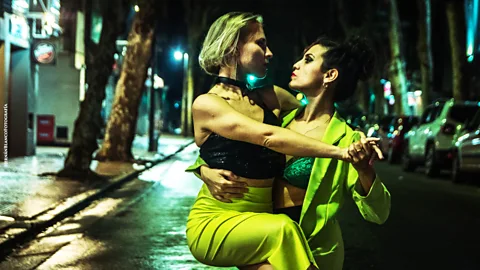 Hernán Blanco
Hernán BlancoTango dancer Anahí Carballo believes any two can tango. Here is her guide to Buenos Aires’s queer tango scene, from Muchaches in the barrio to the Tango World Championships.
A dance characterised by stern expressions, passionate clutches and elegant, entangled steps, the tango is part of Buenos Aires’ DNA, where it earns international accolades at elegant ballroom competitions and draws crowds at informal milonga dance events in the city’s colourful barrios (neighbourhoods).
The SpeciaList
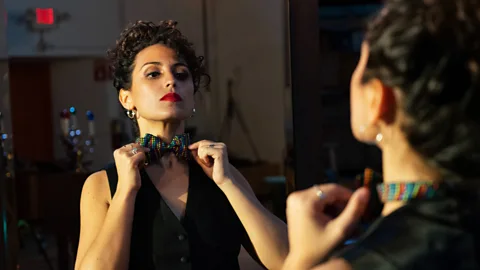
Anahí Carballo founded the dance company Tango Entre Mujeres (Tango Between Women) to create a safe space for women to dance tango together, before establishing the LGBTQ+ dance studio Tango Cuir in 2023. She reached the semi-final in the World Tango Championships in 2023 as one of the minority contestants dancing in same-sex couples.
The original “forbidden” Latin American dance, tango originated with European immigrants who arrived to Buenos Aires’ ports in the 1900s, quickly becoming popular with the city’s lower classes. Same-sex tango was originally common between men as it was considered improper for women to dance. But, as the dance gained status in the ballroom arena with men-women couples, same-sex dancing partners became taboo.
In the last two decades, tango has returned to its same-sex partner roots in Buenos Aires with the Tango Queer movement. Argentina was the first country in Latin America to legalise same-sex marriage in 2010, and the country’s push for progress has led to an ever-growing array of LGBTQ+ centred tango events.
We talked to Anahí Carballo, director of Tango Cuir studio – the only LGBTQ+ dance studio in Buenos Aires – to discover the city’s best spaces for experiencing queer tango culture.
The daughter of professional dancers, Carballo grew up seeing the dance as strictly heteronormative. “I had to wear a miniskirt and heels and dance with a man in the dominant role,” says Carballo, who set up her all-female dance troupe Tango Entre Mujeres in 2014. The troupe had to endure strife to carve a place for queer tango in Buenos Aires. “People would leave the room and say it wasn’t real tango,” says Carballo.
Queer tango remains an act of resistance in Argentina, which is why the close-knit community works together to sustain a colourful, inclusive and safe scene. “Each milonga has different characteristics and is united by the fact that any queer person can feel comfortable in the spaces,” says Carballo.
Here are five of Carballo’s recommendations for experiencing queer tango in passionate Buenos Aires.
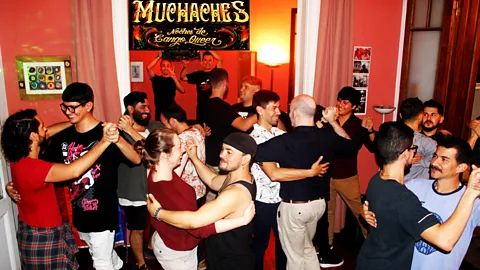 Edgardo Fernández Sesma
Edgardo Fernández Sesma1. Best in the city‘s oldest barrio: Muchaches
With historic buildings dating from the 17th Century, quirky antique shops and countless bars, San Telmo is one of Buenos Aires’ most touristed neighbourhoods. The downtown heart of Buenos Aires, this barrio is known for its bohemian vibes, with tango shows among its many offerings. For a queer twist on the emblematic neighbourhood, Carballo recommends the weekly Friday milonga and class, Muchaches.
“It’s an iconic, very working-class barrio, and Muchaches takes placein an old house, close to [iconic flea market and Historic National Monument] Plaza Dorrego” says Carballo, “It’s a very cultural neighbourhood.”
Muchaches is open to all but takes place in Lugar Gay, a hostel exclusive to same-sex male couples, where it attracts a predominantly male gay crowd.
Muchaches’ teacher Edgardo Fernández Sesma is a seasoned instructor who has been active in the queer tango scene for decades. “He is a great person and very accessible,” says Carballo. “He’s spent a lot of time promoting these queer spaces.”
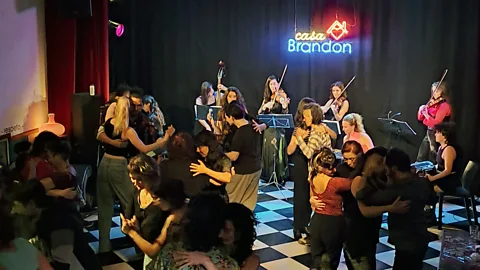 Natalia Teran-Arrotea
Natalia Teran-Arrotea2. Best for discovering LGBTQ+ community centres: Casa Brandon & Feliza
Some of the most special queer tango classes take place in LGBTQ+ spaces “where everything is for the community”, says Carballo. One of them is Milonga Brandon, a large dance party and class that takes place once a month, instructed by “iconic” queer tango dancer, Soledad Nani. “To me, she’s an ambassador of queer tango,” says Carballo. “Her look is trousers, a tie and a shirt; and she has always danced with women. She’s toured England, Russia, the US, Canada, France.”
TIP
Because the Buenos Aires tango scene is dynamic and often changing, Carballo’s recommendation is to experience as much queer tango as possible; from music to dance. “Sometimes a milonga will include a live music show,” she says. “But it depends if there’s money to hire a duo that plays guitar and vocals. Sometimes there won’t be.”
And while Buenos Aires offers dozens of heteronormative tango shows to the public, there are no dedicated queer performances. “It would be amazing, but there’s no fixed event like that,” says Carballo. Instead, she recommends singers like trans artist Susy Shock and drag cabaret star Tita de San Telmo: “You have to follow the artists on social media to see where they’re playing.”
Nani’s milonga takes place in Casa Brandon, a civil and cultural association that works on a multitude of projects to promote inclusivity and equal rights.
Carballo also recommends Tango Para Todes, which takes place in an LGBTQ+ venue, Feliza. “It was made by three friends who got together and just wanted to do something that made them happy,” says Carballo.
Both Casa Brandon and Feliza host queer parties and various gay-oriented events including speed dating, karaoke, jam nights and, of course, plenty of tango.
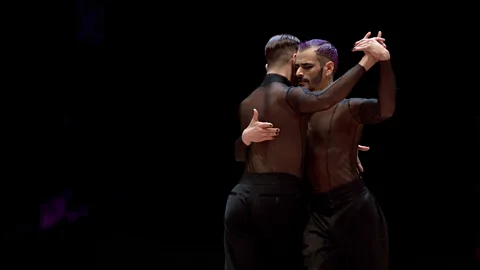 Alamy
Alamy3. Best for an immersive experience: Buenos Aires Queer Tango Festival
For visitors looking to experience queer tango, from live music to dance performances and workshops, Carballo recommends the Queer Tango Festival, which takes place every December. Event organisers Mariana Docampo and Augusto Balzadin – Tango Queer movement leaders and hosts of the bi-weekly Tango Queer La Marsháll/Milonga Tango Queer event in Macedonia Cultural Centre – plan entire days of tango activity; from classes in the daytime to performances at night.
“It is a nice event to time a visit,” says Carballo, who explains that the two-day festival gives people a full 360-experience of “all the queer tango community”.
“You can experience milongas, music, shows and workshops,” she says.
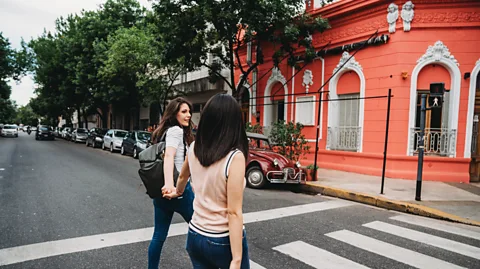 Getty Images
Getty Images4. The best way to start the week: Despelote Tango Queer
Argentina has weathered several economic recessions in the last two decades and has one of the highest inflation rates in the world. Regardless of the financial hardship, Buenos Aires has miraculously maintained a thriving 24/7 bar, club and restaurant scene. Queer tango is no different; even on a Monday you can find an engaging queer tango event — Despelote Tango Queer.
“There’s at least one queer milonga every day, and Despelote is the only one I know of that is hosted on Monday,” says Carballo, who recommends checking ahead of time in case of venue changes or closures, adding: “The economic and political situation in Argentina is unpredictable”.
The Despelote Tango Queer milonga takes place in Libario Cultural Centre in the trendy Palermo district. “It’s an old, restored building, with a bar space and a small stage,” says Carballo. “It’s very welcoming.”
Aside from weekly queer tango, Libario houses theatre, dance, live music and other artistic and cultural events.
Address: Julián Álvarez 1315, C1414DSA Buenos Aires, Argentina
Phone: +54 9 11 2833-1470
Instagram:@eldespelotetango
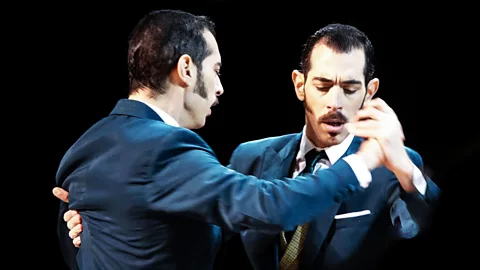 Alamy
Alamy5. Best for watching the professionals: Tango World Championships
Taking place every August for two weeks, the World Tango Championships is where thousands of the world’s best tango stars compete. While there is no competition exclusively for LGBTQ+ partners, same-sex couples have been allowed to compete since 2013.
“There are women-women and men-men partners,” says Carballo, who stresses that queer couples are still very much the minority. “Perhaps there’s around 400 couples. There’ll be around five same-sex pairs.”
Carballo, a 2023 semi-finalist in the championship, says that queer partners have made it to the final several times, despite their low numbers and relatively new participation in the event.
Website: https://buenosaires.gob.ar/cultura/tango-ba-festival-y-mundial
BBC Travel‘s The SpeciaList is a series of guides to popular and emerging destinations around the world, as seen through the eyes of local experts and tastemakers.





